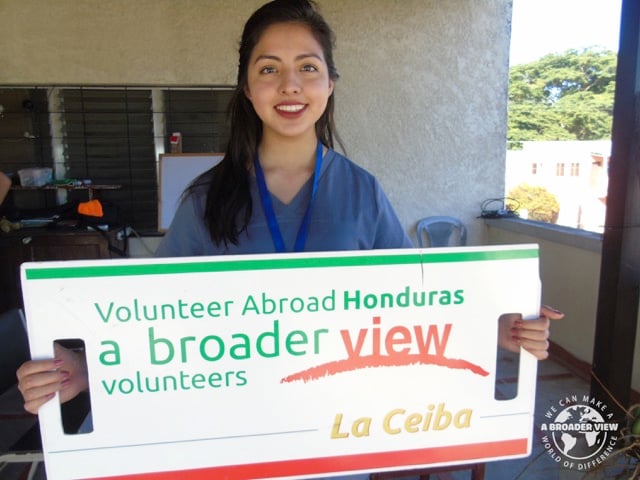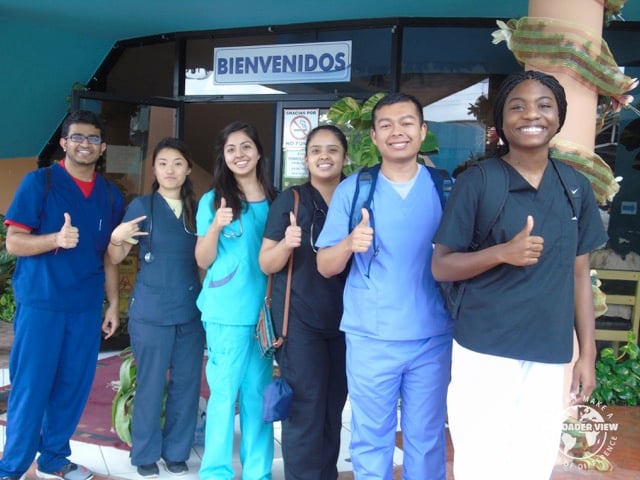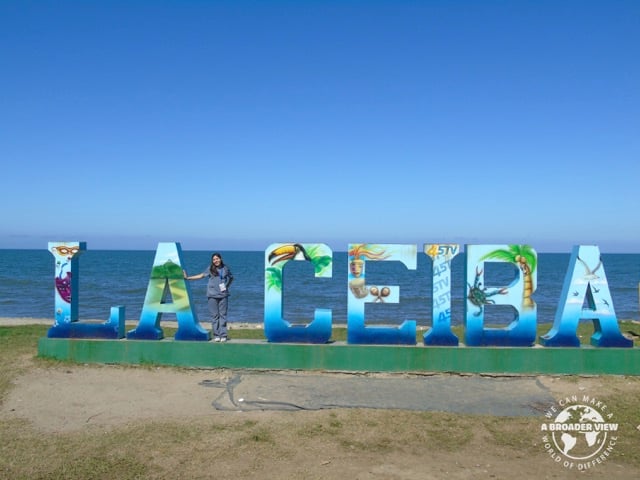I learned so much from this trip. The medical experience gained here cannot be experienced in the US. I watched a range of operation from a miscarriage, a C-section, a broken hand, actually lending a hand in the making of casts, starting an IV.
I realized that so many people depend on these services from doctors. Costs are kept as low as possible in order for services to be accessible to the people. A dental cleaning was $5 and a tooth extraction was $2.50. A medical student was getting her cleaning done at the government clinic, and I think that says a lot about the quality of work for a low price. The doctors here are honest people who like to do their job.

1. How was the local ABV Coordinator and the support provided in-country?
Great! We actually lived in the coordinator’s home with his family.
2. What was the most surprising thing you experienced?
At the program: When we got to the clinics, we realized you have to adapt to their way of doing things. After our time volunteering, we would stay into our lunchtime to fold and roll gauze as well as cotton balls with nurses. It is a small but necessary detail in order to provide proper care for diabetic ulcers, injections, and wounds, I recommend you view it as good use of your downtime.
At the accommodation: I have never taken such cold showers in my life. But eventually at the end of the day it is a relief after a sweaty day.
About the country: The friendliness of the city. We got to know a lot of people by name in our every day experience here. Anyone from taxi drivers, firefighters, security guards, patients, and of course hospital staff.
3. What was most difficult to experience?
At the program: The fact that hospitals make do with what they have to treat patients. I saw a child with fever and a rash, and had to take her temperature with a thin mercury thermometer which gave inadequate results. After realizing none of the thermometers took adequate temperatures I donated one to the hospital.
At the accommodation: How early in the morning we had to leave for the hospital was a challenge for me personally. We were expected to be at the clinic at 7am and thankfully our coordinator was kind enough to give us a ride to the hospital when he could. Otherwise cab fare is cheap and walking a distance was no more than 15 minutes.
The country: Traveling to a rural hospital for a day and touring the hospital was an eyeopener for me on the level of care of the country. Of the two A/C units, one was in the children’s patient room, the other in the emergency patient room. The rest of the building was extremely hot.
Patients in the maternity ward were accommodated for long term stay in the duration of their pregnancy to get neonatal care. Women traveled a long ways to give birth at the hospital because otherwise death was certainly a statistical reality.

4. Any tips for future volunteers…
Clothing: Socks, shorts, tshirts, and at least 4-6 pairs of scrubs if not more. Don’t’ forget your towel and pack a thin blanket for the night.
Donations: Hospitals, especially the rural ones we visited are all in need. I recommend donating gloves, surgical masks, and thermometers. I have yet to come across digital thermometers here which would be great. The takeaway here is that anything and everything is appreciated.
Weather: Check the weather, our stay here included lots of sun and lots of rain. I would pack a rain coat and plenty of t-shirts.
4.1. Other things volunteers should know:
a.- Respect the professionals who allow you to shadow as well as patients and everyone you come across. Please’s, thank you’s, and basic etiquette goes a long way.
b.- Although there may be a language barrier, do your best to speak as much Spanish as you can and learn in your day to day interactions. Don’t be shy!
c.- You’ll feel at home in no time, it really is an amazing experience to travel to another country so different from your own. Your first day is especially a long one as well as an eye opener.
d.- Keep a positive attitude. Your experience here is really what you make it to be and you can learn a lot in your short time here, both culturally and in the medical field. You’ll also come to be good friends with the people you travel with, which is great.

5. Personal Paragraph (ABV Program Testimonial):
I learned so much from this trip. The medical experience gained here cannot be experienced in the US. I watched a range of operation from a miscarriage, a C-section, a broken hand, actually lending a hand in the making of casts, starting an IV.
I realized that so many people depend on these services from doctors. Costs are kept as low as possible in order for services to be accessible to the people. A dental cleaning was $5 and a tooth extraction was $2.50. A medical student was getting her cleaning done at the government clinic, and I think that says a lot about the quality of work for a low price. The doctors here are honest people who like to do their job.
6. How would you describe your accommodation, meals and security:
Honduran food is really good homemade food, you’ll appreciate and think the same if you’re also a college student. Our coordinator Rafael and his family have a very nice home, and were very hospitable. A walk to the supermarket for snacks is a smart move in case you like dinners to be on the heavier side.
I felt secure in the neighborhood, around the city, and when traveling. Yes, take necessary precautions like bringing a casual purse to put your phone away in but you’re in a safe place.
7. What was your favorite memory of this trip?
Program: Observing my first surgery from inside the operating room. The patient had been in a motorcycle accident and the procedure included inserting thin metal rods in the patient’s broken fingers. He was completely put under and it was exhilarating to see the pace at which the doctors work, the teamwork, and the atmosphere in the operation room which was very relaxed in juxtaposition to the horrific state of the patient’s pinky finger. The doctors were open to us asking questions and I loved all forty minutes of the operation. Each operation witnessed was truly a great learning experience.
Country: Hiking through Pico Bonito, a national park was the most memorable trip. There is an upstream spot where it is safe to drink the water from the river, and we ate the cocoa fruit from a wild tree. Honduras is a country that respects it’s jungles and nature, all five hours of hiking were worth the experience.
8. How was the ABV USA support prior traveling?
Communication (Phone/emails/Online chat): ABV communicated through emails and applying as well as navigating through their website was very easy.
Website Information: They provided an overview of the country as well as traveling tips which were very helpful reads.
9. Are you willing to speak to other potential ABV volunteers?
Other potential volunteers are welcome to communicate with me or the group I traveled with. We are students at Texas A&M, and the six of us who traveled here are all pre-health students.
10. Can you tell us how did you find or know about A Broader View?
I traveled with ABV as part of the Texas A&M. We had two students who were group leaders and had traveled abroad before, so I felt completely safe traveling as a collective group.